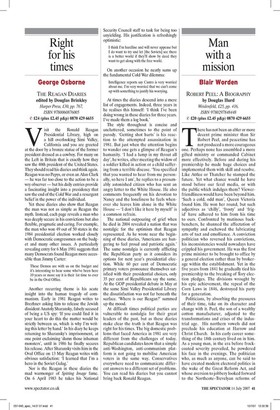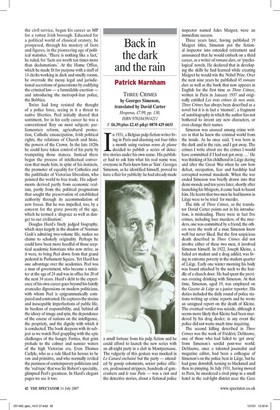Man with a mission
Blair Worden ROBERT PEEL: A BIOGRAPHY by Douglas Hurd Weidenfeld, £25, pp. 416, ISBN 9780297848448 © £20 (plus £2.45 p&p) 0870 429 6655 There has not been an abler or more decent prime minister than Sir Robert Peel, and peacetime has not produced a more courageous one. Perhaps none has assembled a more gifted ministry or commanded Cabinet more effectively. Before and during his premiership he made huge choices and implemented them with skill and resolve. Like Attlee or Thatcher he stamped the future. Yet what chance would he have stood before our feral media, or with the public which indulges them? Viewerfriendliness would have been beyond him. 'Such a cold, odd man', Queen Victoria found him. He won her round, but such adjectives as 'chilly', 'frosty' and 'frigid' have adhered to him from his time to ours. Confronted by mutinous backbenchers, he shunned the affectation of sympathy and eschewed the lubricating arts of tact and emollience. A conviction politician who reversed his convictions, his inconsistencies would nowadays have crippled his government. He was the first prime minister to be brought to office by a general election rather than by brokerage within the establishment. Yet in the five years from 1841 he gradually tied his premiership to the breaking of Tory election pledges. The divisions wrought by his epic achievement, the repeal of the Corn Laws in 1846, destroyed his party for a generation.
Politicians, by absorbing the pressures of their time, take on its character and change with it. Peel, the son of a wealthy cotton manufacturer, adjusted to the transformations and crises of the industrial age. His northern vowels did not preclude his education at Harrow and Christ Church. In his early career something of the 18th century lived on in him. As a young man, in the era before frockcoated severity prevailed, he powdered his face in the evenings. The politician who, as much as anyone, can be said to have created modern electoral politics in the wake of the Great Reform Act, and whose aversion to jobbery looked forward to the Northcote–Trevelyan reforms of the civil service, began his career as MP for a rotten Irish borough. Educated for a political world of classical oratory, he prospered, through his mastery of facts and figures, in the pioneering age of political statistics. 'There is nothing like a fact,' he ruled, for 'facts are worth ten times more than declamations.' At the Home Office, which he made fit for purpose with a staff of 14 clerks working in dark and smelly rooms, he overrode the messy legal and jurisdictional accretions of generations by codifying the criminal law — a formidable exertion — and introducing the metropol-itan police, the Bobbies.
Tories had long resisted the thought of a police force, seeing in it a threat to native liberties. Peel initially shared that sentiment, for in his early career he was a conventional Tory on most subjects: parliamentary reform, agricultural protection, Catholic emancipation, Irish political rights, the relations of Church and State, the powers of the Crown. In the late 1820s he could have taken control of his party by trumpeting those stances. Instead there began the process of intellectual conversion that made him, in spite of his instincts, the promoter of equality for Catholics and the pathfinder of Victorian liberalism, who pointed the world to free trade. His adjustments derived partly from economic realism, partly from the political pragmatism that sought the preservation of established authority through its accommodation of new forces. But he was impelled, too, by a concern for the grave poverty of the age, which he termed a 'disgrace as well as danger to our civilisation'.
Douglas Hurd's finely judged biography, which stays largely in the shadow of Norman Gash's admiring two-volume life, makes no claims to scholarly originality. Perhaps he could have been more heedful of those sceptical academic historians who now strive, as it were, to bring Peel down from that grand pedestal in Parliament Square. Yet Hurd has one advantage over the academics. Peel was a man of government, who became a minister at the age of 24 and was in office for 20 of the next 34 years. Hurd's debt to the experience of his own career goes beyond his faintly avuncular digressions on modern politicians, with whom Peel is epigrammatically compared and contrasted. He captures the strains and inescapable imperfections of public life, its burdens of responsibility, and, behind all the idiocy of image and spin, the dependence of the course of nations on the intelligence, the propriety, and the dignity with which it is conducted. The book deepens with its subject as we watch Peel grappling with the epic challenges of the hungry Forties, that grim prelude to the calmer and sunnier waters of the high Victorian era. Even Thomas Carlyle, who as a rule liked his heroes to be raw and primitive, and who normally reviled the puniness of contemporary politicians and the 'red tape' that was Sir Robert's speciality, glimpsed Peel's greatness. In Hurd's elegant pages we see it too.


















































 Previous page
Previous page